 Petzlover
Petzlover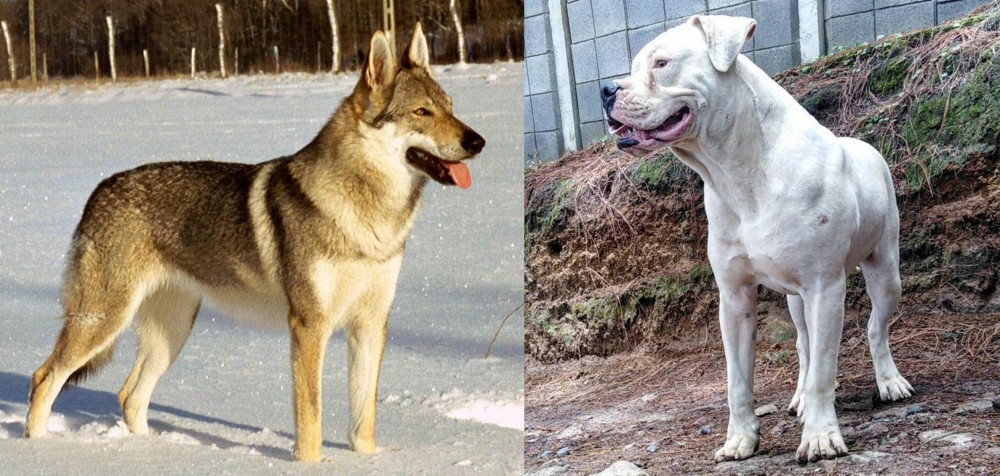 Czechoslovakian Wolfdog is originated from Czech Republic but Dogo Guatemalteco is originated from Guatemala. Both Czechoslovakian Wolfdog and Dogo Guatemalteco are having almost same height. Czechoslovakian Wolfdog may weigh 19 kg / 41 pounds lesser than Dogo Guatemalteco. Czechoslovakian Wolfdog may live 3 years more than Dogo Guatemalteco. Both Czechoslovakian Wolfdog and Dogo Guatemalteco has same litter size. Both Czechoslovakian Wolfdog and Dogo Guatemalteco requires Moderate Maintenance.
Czechoslovakian Wolfdog is originated from Czech Republic but Dogo Guatemalteco is originated from Guatemala. Both Czechoslovakian Wolfdog and Dogo Guatemalteco are having almost same height. Czechoslovakian Wolfdog may weigh 19 kg / 41 pounds lesser than Dogo Guatemalteco. Czechoslovakian Wolfdog may live 3 years more than Dogo Guatemalteco. Both Czechoslovakian Wolfdog and Dogo Guatemalteco has same litter size. Both Czechoslovakian Wolfdog and Dogo Guatemalteco requires Moderate Maintenance.
 The Czechoslovakian Wolfdog is a mix between a German Shepherd and a Carpathian wolf. In fact the Czechoslovakian Vlcak is another name for the Czechoslovakian Wolfdog and Vlcak is the Czech name for a German Shepard dog.
The Czechoslovakian Wolfdog is a mix between a German Shepherd and a Carpathian wolf. In fact the Czechoslovakian Vlcak is another name for the Czechoslovakian Wolfdog and Vlcak is the Czech name for a German Shepard dog.
When you translate the name, it means Czechoslovakian German Shepherd. There was a biological experiment that began in 1955 and these experimental breedings went on for a decade, so that in 1965 a plan was created for the breeding of this new breed.
It was in 1982 that the Czechoslovakian Vlcak was recognized as a national breed in the former Czechoslovakian Republic and recognized by the United Kennel Club in 2006.
This attractive, intelligent looking dog won the title of ‘World Champion’ at the World Dog Show in 1990 and in 1999, the breed met all criteria of the World Canine Organization, earning full recognition of the Czechoslovakian Wolfdog breed.
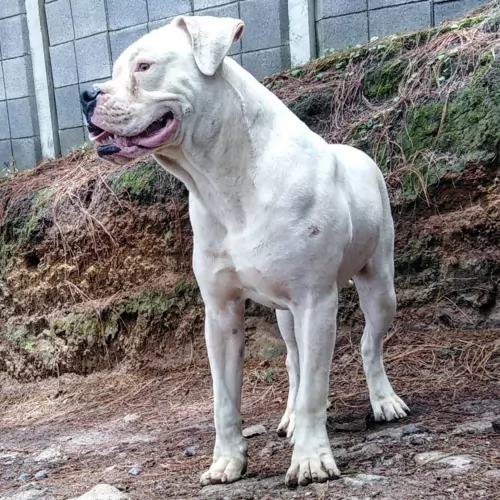 Known as the Guatemalteco Bull Terrier or Guatemalan Molosser, the Dogo Guatemalteco is also known as the Bull Terrier Guatemalteco, Guatemalan Bull Terrier, and Guatemalan Molosser.
Known as the Guatemalteco Bull Terrier or Guatemalan Molosser, the Dogo Guatemalteco is also known as the Bull Terrier Guatemalteco, Guatemalan Bull Terrier, and Guatemalan Molosser.
This big Molosser-type dog originates in Guatemala. In the 20th century, it was known as the Bullterrier Guatemalteco, but at the end of the century, it was changed to Dogo Guatemalteco.
Today, while the dog is kept as a companion dog, most are working guard dogs. The Dogo Guatemalteco isn’t recognized by any major international kennel clubs. However, the Kennel Club of Guatemala has given full recognition to this dog and it was in 1981 that the Guatemalan government named the dog as their national dog breed.
 The Czechoslovakian Wolfdog looks like a true German Shepherd/Wolf mix with his erect ears, bushy tail and straight, muscular legs.
The Czechoslovakian Wolfdog looks like a true German Shepherd/Wolf mix with his erect ears, bushy tail and straight, muscular legs.
The eyes of the dog are slanted and brown. He stands at about 65cm in height and weighs up to 26kg. The thick coat of the dog is greyish in color but other colors come in as well such as white, cream, black, silver and yellow - all wolf colors. In fact the density of the coat as well as the color changes according to the seasons.
The coat is particularly thick in the Winter, thinning out in the Summer. The coat color may be yellow-gray or silver-gray.
Having a pet which has some wild animal mix can be risky and dangerous. Adding wild animal DNA means that you can get some of the behavior of the wild animal added in and this can be asking for trouble.
When the Czechoslovakian Wolfdog turns on a person, he will be blamed and put down, whereas it is the stupidity of the human to breed such dogs and bring them into their homes in the first place. You need to be careful with children in the home, especially if they don’t know how to treat a dog with respect.
Nonetheless the Czechoslovakian Wolfdog is able to develop a deep relationship with his owner. He is a dog who, when training and socialized, can gets on well with his human family as well as with other pets in the family.
He has got other excellent characteristics such as being fearless and courageous. He is intelligent and learns easily.
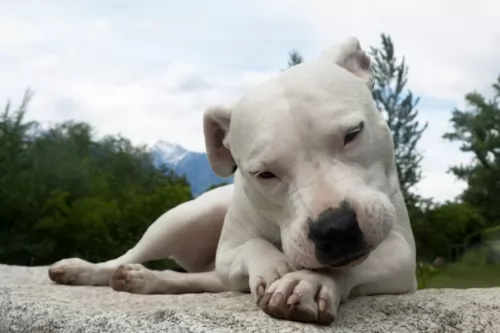 The Guatemalteco is a medium to large dog standing at 54 – 60cm and weighing between 40-45kg. He has a short, smooth coat and is essentially white with some black markings on the head.
The Guatemalteco is a medium to large dog standing at 54 – 60cm and weighing between 40-45kg. He has a short, smooth coat and is essentially white with some black markings on the head.
This breed was created from a crossing between a bull terrier, boxer and dalmatian. Some of the dogs are thickly built, while others are more leaner and athletic looking.
The ears of the dog vary quite a bit because while sometimes the ears fold down closely to the head, others are semi-pricked. There are some dog owners who have their dogs ears cropped into fully erect triangular shapes. The eye are small and usually dark brown.
The Dogo Guatemalteco is a fearless, evenly tempered dog. He was bred as a guard dog and he wants to protect his human family, forming a deep bond with them. It makes them difficult to re-home because of this.
It is imperative to have this dog trained and socialized because it might believe its the leader of the pack in your home. He is quite capable of getting along well with children and pets in the home. Because of his dominant nature, he isn’t suited as a pet for the first-time dog owner. He also doesn’t warm easily to strangers.
 The beautiful Czechoslavakian Wolfdog resembles a wolf and in many of these dogs, their characteristics are wolf-like too. The dog is confident and independent, but it also able to form good relationships with his human family.
The beautiful Czechoslavakian Wolfdog resembles a wolf and in many of these dogs, their characteristics are wolf-like too. The dog is confident and independent, but it also able to form good relationships with his human family.
Many people thrill at the idea of having a pet which has a wild side to him, but there is a price to pay for having such a pet in your home. Their wild side can suddenly come to the fore, with dangerous consequences.
There are so many dog breeds to choose from that surely it isn’t necessary to start tampering with animals from the wild?
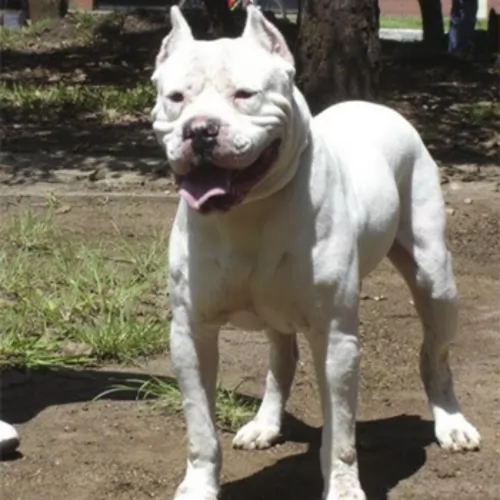 Your Dogo Guatemalteco is an intelligent dog breed, and because he is strong-willed and stubborn he might give you a hard time during training. It is possible though and it is important as the training will turn him into an obedient, relaxed dog, able to get on with all his family members, including pets.
Your Dogo Guatemalteco is an intelligent dog breed, and because he is strong-willed and stubborn he might give you a hard time during training. It is possible though and it is important as the training will turn him into an obedient, relaxed dog, able to get on with all his family members, including pets.
He is an energetic dog and will require walks and other forms of exercise each day.
This is certainly not the kind of dog that you buy to protect your property and provide little else for him except food and water. Frustration on the dog’s part can lead to destructive behavior and aggression.
 Your Czechoslovakian Wolfdog is a healthy dog who with good health care, can reach the age of 12 to 15 years. However, it is good to be forewarned about some dog sicknesses that your dog might get and which could be detrimental to your dog’s quality of life.
Your Czechoslovakian Wolfdog is a healthy dog who with good health care, can reach the age of 12 to 15 years. However, it is good to be forewarned about some dog sicknesses that your dog might get and which could be detrimental to your dog’s quality of life.
This disease comes about when the ball and socket joint at the hip doesn’t form properly. The bones rub and chafe when the dog moves and the condition just gets worse as time goes on. Your dog can actually end up with arthritis, and worse, become lame.
This is a progressive deterioration of the spinal cord which causes lameness in your pet’s hind legs. It is incurable and can be the end of your pet. The exact cause of this tragic illness is unknown.
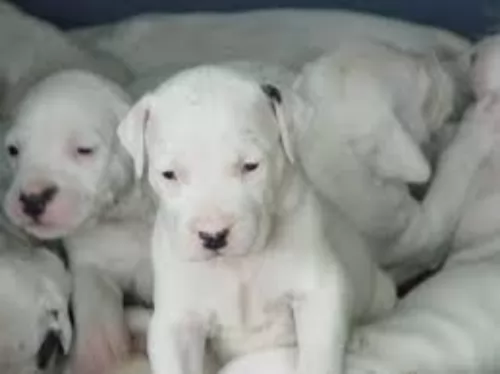 This dog can be susceptible to skin allergies. The skin is sensitive and prone to rashes.
This dog can be susceptible to skin allergies. The skin is sensitive and prone to rashes.
Another health concern with this dog because of his white coat, is congenital deafness. The deafness could be in one- or both ears.
The dog could also experience lameness, of which the most common problem is hip dysplasia. Because skeletal problems occur in this breed, it is advisable for owners to have their pet tested by the Orthopedic Foundation for Animals.
 Vlcaks have been specifically bred for stamina and if you neglect to exercise him, he’ll become bored and frustrated and possibly destructive and aggressive. He must be trained and he must be constantly provided with lots of exercise and activities.
Vlcaks have been specifically bred for stamina and if you neglect to exercise him, he’ll become bored and frustrated and possibly destructive and aggressive. He must be trained and he must be constantly provided with lots of exercise and activities.
Because of the wolf side of this dog, Czechoslovakian Wolfdogs have a high prey drive, so he will need to be trained and socialized if you want him to get along with your other pets in the home.
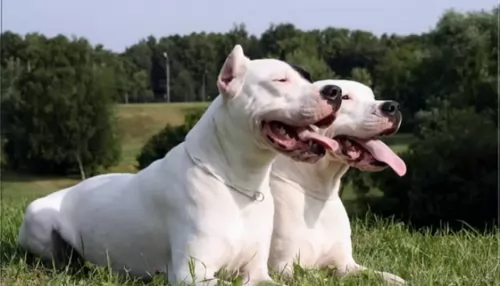 The coat of the dog is short and harsh and it sheds throughout the year. While he is still looked upon as a low maintenance dog, regular brushing will be required twice a week.
The coat of the dog is short and harsh and it sheds throughout the year. While he is still looked upon as a low maintenance dog, regular brushing will be required twice a week.
Because he is a dog breed that is susceptible to skin allergies, bathing isn't necessary as it removes the dog’s natural oils.
Other areas of grooming for this dog are brushing his teeth twice a week, trimming his nails and checking his ears.
Always choose a high quality dog food for your Dogo Guatemalteco and look at the feeding recommendations on the packaging.
When you feed your pet kibble, you can also mix in some cooked brown rice, vegetable and chicken for variety and contentment.
Raw meat is also advised from time to time. Don’t just go on and on through the years feeding your dog the same amount of food, as there are factors to take into account when deciding on food quantity. The age of your dog, it’s stage of life and its activity levels will mean regulating your pet’s food to match his needs.